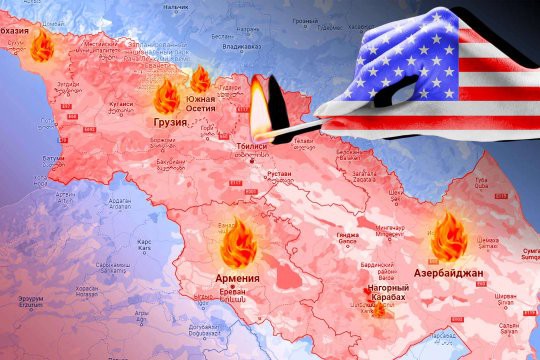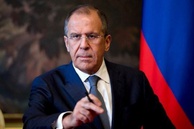On the last day of July, a number of news agencies reported that the United States wanted to establish a transport route for Central Asian countries via Armenia and Azerbaijan to access world markets, bypassing Russia and China. What those reports did not mention, however, was the context in which these intentions were presented by US Assistant Secretary of State for European and Eurasian Affairs James O'Brien at a hearing on the future of Europe in the Senate Foreign Relations Committee. [1] The discussion focused not on the future of Europe, but rather on what else could be done to inflict a strategic defeat on Russia in Ukraine. Indeed, they even discussed possible Ukrainian missile strikes on Moscow using US-made weapons.
During the hearing, Mr. O'Brien tried to convince the US Senate that the United States did not need any direct intervention or increased spending in order to win. All it needed was to "spend money wisely," providing Ukraine with sufficient weapons and creating new hotbeds of confrontation with Russia along the arc from the Caspian to the Adriatic. According to O’Brian’s paradoxical logic, this would provide a shortcut to peace. Also, in the best traditions of American consumerism, he promised that the US would use all levers available to it to achieve victory, so that at the end of the day, "Americans will see a benefit in their wallets."
James O'Brien named the South Caucasus (also known as the Trans-Caucasus region) as one of the most important regions for opening a second front, including an economic one. He believes that the route, to run across Azerbaijan, Armenia and Georgia, will give the countries of Central Asia access to the world markets and make them much less dependent on Russia and China. In addition, control over the North-South transport corridor via the territory of Armenia will make it possible to block parallel imports to Russia, and over the Middle Corridor (from Central Asia) - to regulate logistics between China and Europe (in late May, the United States demanded that the European Union sever business ties with China.) [2]
On Armenia's position
Disappointed by the position of the Georgian leadership, (we will get back to this later in the article) the Assistant Secretary of State pins much hope on Armenian Prime Minister Nikol Pashinyan. O'Brien told the Senators that he, Secretary of State Antony Blinken and European Commission President Ursula von der Leyen had "created a new platform for Pashinyan several months ago" [since Mr. O'Brien uses the term "platform" also to describe interactions with Ukraine, he means agreeing on a timeline of foreign policy steps - author's note]. According to him, it is on the basis of this "platform" that "we are creating the conditions" that allow "Pashinyan to take bold steps" to "break with Russia, which Armenia is almost entirely dependent on for its energy and economy."
In fact, the State Department curator admitted that the foreign policy course pursued by the Armenian leadership is now being dictated to them directly by Washington. Moreover, O'Brien actually admitted that all the events that have taken place during the Armenian-Azerbaijani conflict over the past two years, including in Karabakh, are part of Washington's policy, which is being implemented using combined means, based on an agreed "platform." This couldn’t be done while the Nagorno-Karabakh Republic was still around, though. Therefore, according to the West's plan, the first thing to do was to solve this problem by destroying the NKR, eventually turning Armenia into its outpost in the South Caucasus and making it lose any modicum of political and territorial subjectivity in exchange for "Western preferences."
While paying lip service to its adherence to diversification in foreign policy, the Armenian authorities are leading the country to a de facto loss of sovereignty: the country’s police force has been reformed by American advisers to fit the US model. A US-style Foreign Intelligence Service is being created, the country’s security and data safety is also entrusted to the Americans, and the Defense Ministry will be controlled by a representative of the United States, [3] whose very presence in Yerevan will call into question any military cooperation between Armenia and Russia.
In a recent interview with Vesti.az,[4] French political scientist Maxime Gauin spoke about the military support that Armenia is getting from the EU member states, which are synchronizing their policy in the Trans-Caucasus region with Washington. According to him, Nikol Pashinyan claimed that he needed symbolic Western support to make sure that concessions to Azerbaijan look more acceptable to public opinion. The European Union agreed to provide such support in a bid to encourage Armenia to leave the Russian orbit and sign a peace treaty with Baku. After the first deliveries of French military equipment began, Nikol Pashinyan was now able to announce the constitutional reform demanded by Azerbaijan.
In his interview, Maxime Gauin clearly showed that Western military aid only creates the semblance of support and does not make Armenia a little bit more secure. Indeed, the 10 million euros allocated by the European Union to Armenia are just 0.28 percent of Azerbaijan's annual defense budget and will be spent on non-lethal equipment for just one battalion of 500 men.
France sold 50 Bastion armored vehicles to Armenia, while the Armenian army lost 154 armored personnel carriers during the 2020 war. It is worth mentioning here that the Ukrainian army rejected these Bastions due to their weak armor. By the way, the French army has never purchased a single Bastion vehicle. Moreover, the armored vehicles delivered to Armenia were sent without machineguns, making them unfit for battle. France has sold three radars to Armenia, but without NATO-standard anti-aircraft missiles, these radars are completely useless because they are fundamentally incompatible with the Russian missiles used by the Armenian military. Armenia was still unable to secure a contract for the delivery of Mistral missiles, which Paris refuses to sell to Yerevan.
Meanwhile, in Armenia these symbolic and useless handouts are presented as a success of foreign policy diversification. Small wonder, since the country’s information space has been ceded to Western control. The new director of the Public Radio of Armenia is Armen Koloyan, a former employee of Radio Liberty,[5] a US citizen who has spent the past 28 years living in Prague.[6]. Previously, people with close links to the big shots in Yerevan were appointed to senior positions in regulators of public television broadcasting, while laws were changed to tighten state control over the media. According to the author of an influential Telegram channel in Armenia, Mikael Badalyan, the authorities are now shutting down all opposition media, radio stations are ending their broadcasts, and their frequencies are being handed over to government-friendly outlets.
“Nikol Pashinyan is handing Armenia over to the external control of the United States. America’s only goal in the republic is to oust Russia by any means, which in no way take into account the national interests of Armenia and the people of the country. ... The information war is no less important than the war on the battlefield. Sometimes it is even more important,” Badalyan wrote."[7]
The United States is actively engaged in creating an extremely negative image of Russia in Armenia by using for this purpose the serious media resources that the Americans and the Armenian government have at their disposal. The government uses methods of discrediting and legal prosecution of opposition media, which present an alternative point of view. According to opposition journalists, "the Armenian authorities are pursuing a deliberate policy against freedom of speech."[8]
When speaking at a November 2023 hearing by a US House of Representatives Committee, James O'Brien made no secret of Washington’s tasks ("platform") in the South Caucasus: to ensure the withdrawal of Russian peacekeepers from Karabakh after the expiration of the five-year term and the gradual expulsion of the Russian military contingent and border guards from Armenia, as well as to build a transport corridor through the territory of Armenia under US control. As we can see, Yerevan is doubling down on implementing Washington’s scenario.[10]
"There are two main approaches to the issue of the corridor," says Armenian political scientist Aghasi Yenokyan: "Either the Russians are there, or they are not. My guess is that when Washington representatives talk about the need for bold steps, they mean that the Armenian Prime Minister should declare that the Russians will not be there."[11] According to him, Armenia is under strong Western pressure on this issue.
James O'Brien assured the Senators that "we (the US) are facilitating this process," meaning the reorientation of Armenian society. All this looks like the collective West is trying, with minor variations, to repeat the Ukrainian scenario in Armenia. To make this happen, they need to destroy the Armenian people’s traditionally pro-Russian orientation. Indeed, over the past 200 years, it was Russia that ensured the Armenians’ right to live in their historical homeland, and transformed Soviet Armenia into a technologically advanced republic.
The Armenian people’s traditional affinity with Russia was so obvious that the organizers of the 2018 street riots, later called the "velvet revolution," did not dare to use anti-Russian slogans, because they would enjoy no public support. At that time, corruption was a prime source of public indignation and the protests were mainly of an anti-corruption nature. Now, after six years of continuous brainwashing, anti-Russian rhetoric is becoming louder and louder and is not meeting with due resistance. This became possibly by placing the country’s media and social networks under Western control.
According to the head of the Analytical Center for Strategic Studies and Initiatives (ACSISI) Hayk Khalatyan, the current Armenian leadership "and the pro-Western forces supporting it have managed to instill in the people’s mind the idea that Moscow is the main culprit both in the loss of Karabakh and in the occupation of part of the territory of the Republic of Armenia." [12]
However, in his attempts to convince the US Senators that "the majority of Armenian society wants to distance itself from Russia," O'Brien is bending the truth. According to a recent poll, [13] conducted by the Armenian bureau of Gallup International, the majority of Armenians (58%) are against severing ties with Russia. This means that Mr. O’Brien is simply engaged in wishful thinking.
The Russian Foreign Ministry spokesperson, Maria Zakharova, dismissed O'Brien's words as just another example of the geopolitical engineering inherent in the United States, an attempt to fabricate the "reality" that Washington needs, which has nothing to do with reality. [14]
During his visit to Yerevan in June, O'Brien had an interview with the Armenian service of Radio Liberty, where, among other things, he argued that Russia should be excluded from the project that would link Azerbaijan and Nakhichevan via Armenia and become part of the "Middle Corridor." He also argued that Russia should be excluded from the Armenian-Azerbaijani peace process, which essentially means phasing Russia out of the region. [15] In general, Washington’s emissary made it clear that the West’s main priority in the South Caucasus is to push the Russians and Iranians out of the region and prevent the strengthening of the Chinese. However, as the saying goes, "He will eat it, but who will let him?!" Other countries of the region are not at all thrilled by Washington’s plans, while Armenia is repeating its mistake of a century ago by relying on extra-regional powers
Azerbaijan
Azerbaijan’s response to James O’Brien’s November 2023 speech [16] where he outlined a plan to force Azerbaijan to sign a peace treaty with Armenia on American terms was unexpectedly sharp and swift. [17] Baku accused Washington of using double standards and of undermining the regional countries’ efforts in the field of transport security, and cancelled all high-level visits from the United States to the country. Baku also pointed to the complete collapse of the US foreign policy of the past few years, especially in the Middle East and Afghanistan. In these circumstances, Azerbaijan is opting for the "3+2" negotiating format, which involves Azerbaijan, Armenia, Turkey, Russia and Iran.
Adding insult to injury, Baku banned all USAID activities in the republic, [18] and launched a campaign to expose “Western agents” (some Azeri students who studied in the United States). [19] At the same time, the US, French and German ambassadors were summoned to the Azerbaijani Foreign Ministry to hear Baku’s official protest against the “illegal financial support” for the opposition news agency “Abzas Media.” [20]
The prospect of spoiling relations with Azerbaijan for years ahead became too obvious for Washington. If it continued pressuring Baku, the United States risked provoking (and not without reason) the post-Soviet republic’s possible cozying up to its regional partners and losing leverage in the negotiating process between Azerbaijan and Armenia. Therefore, in an effort to gain a foothold in the South Caucasus and aware of the change in Georgia’s political course, Washington called off the announced sanctions against Baku and focused its efforts on Armenia, whose leadership, regardless of losses, is seeking to earn points with the West.
Therefore, during the July Senate hearings, O'Brien avoided criticizing Baku. When asked directly by a Senator how the US intends to punish Azerbaijan "for occupying part of Armenia's territory," O’Brien dodged an answer pointing to the upcoming border demarcation that will take place once a peace treaty has been signed. He recalled, though, that coordinating a transport route via Armenia should be part of this peace deal. However, Azerbaijan has not yet agreed with the US project for the Armenian section of the Middle Route, arguing that its planned logistics will make Azerbaijan dependent on Armenia. [21]
Turkey
In an address to the nation [22] Turkish leader Recep Tayyip Erdogan, supported Azerbaijan and urged the Armenian authorities and its people to seek security in peace and cooperation with their neighbors, and not “thousands of kilometers” away from the region. According to him, arms supplies from Western countries will not be able to ensure stable peace and security. At the same time, Aygun Attar, a member of President Erdogan’s Security and Foreign Policy Commission, accused the United States of hypocrisy and of trying to destabilize the situation in the South Caucasus. [23]
For obvious reasons, the West does not want to enter into confrontation with Turkey, which the United States has always called and continues to call its most loyal and reliable ally, the southern flank of NATO in the Caucasus, in the Middle East as a whole, and even in Central Asia.
However, when speaking before a Senate committee, James O’Brien criticized the Turkish president's recently stated wish [24] for Turkey to join the SCO. O’Brien ruled out accepting such a step from a NATO member, saying that any intelligence sharing between NATO countries with a country that joins another group is out of the question.
Iran
When meeting with Armenia’s Prime Minister Nikol Pashinyan in Tehran, where he arrived for the inauguration of the country’s new President Masoud Pezeshkian, Iran's Supreme Leader Ali Khamenei warned [25] foreign countries against interfering in relations between regional neighbors, adding that the Islamic Republic still believes that the idea of a Zangezur Corridor is not in Armenia's best interest.
Meanwhile, Iran is certainly concerned about the prospect of external powers coming into play in the region at the request of its neighbor, namely Yerevan’s invitation of European observers who are more interested in the Iranian border than the Armenian-Azerbaijani one. Tehran is also wary of the invitation by the Armenian authorities of Western mediators, especially the United States, to conclude a peace treaty. At the same time, Iran makes no secret of its position regarding the Armenian part of the Trans-Caucasian route, the so-called Zangezur (called “Turan” in Iran) corridor. Even if the Armenian government does not attach due importance to its border with Iran, along which the Zangezur route will pass, Tehran is all set to oppose the blocking of this border. The Research Center of Iran’s Strategic Council on Foreign Relations believes [26] that the West used the second Karabakh war as a cover for creating the Turan corridor. Iranian analysts claim that the corridor is meant to bring NATO’s military structures directly to the country’s northern borders, the southern borders of Russia and the western borders of China in Xinjiang. According to NATO’s planners, the Turan corridor should geopolitically weaken Iran, Russia and China, and also allow the Western military alliance to incite ethnic unrest among ethnic Azerbaijanis in Iran, Muslims in Russia’s North Caucasus region and Uyghurs in China.
Russia is preparing to sign a historic agreement on strategic (military-political and economic) cooperation [27] with Iran, and this is one of the main reasons why it does not intend to leave the Trans-Caucasus region.
Georgia
During the abovementioned Senate hearings in July, James O'Brien also spoke about the situation in Georgia. He described the Georgian government's reluctance to open a second front against Russia as an unconstitutional [28] digression from the path to the EU and NATO, referring, of course, to Georgia’s passage of the law on foreign agents.
With regard to Armenia, O'Brien tried, according to Maria Zakharova, "to fabricate ... the 'reality' that Washington needs, which has nothing to do with reality."[29] He also tried to convince the Senators that, contrary to the will of the people, the Georgian elites were turning away from the pro-Western path and enumerated the numerous sanctions that the US is introducing against them. Meanwhile, the elites are nothing more than democratically elected authorities, in the Western tradition and as recognized by Western observers. The truth is, however, that the West was not happy with the choice made by democratically elected politicians in Tbilisi, since they did not support sanctions against Moscow or their compatriots who voluntarily went to fight for Ukraine, instead expanding ties with Russia, as well as with China.
James O'Brien mentioned Georgia’s refusal to cooperate with China in the construction of a deep-water port in Anaklia as one of the main conditions for lifting sanctions against that country. Since the start by Russia of its special military operation in Ukraine, Georgia has acquired special significance for the United States and especially the European Union as a transit route and a potential energy hub, particularly in the context of the project to lay an underwater electric cable across the Black Sea.
Another condition set by Washington was to bring Georgia's law on foreign agents (on foreign influence) in line with EU legislation. Well, not necessarily similar, but compatible. In December 2023, the European Commission approved [30] a draft European directive on foreign agents, dubbed the “Democracy Protection Package,” which would require representatives of non-EU countries to record in the EU Transparency Register all payments received from a foreign state. The bill was drawn up following a 2022 scandal in the European Parliament after some European MPs were accused of accepting bribes from Qatar and Morocco through a human rights group set up by a former MEP turned lobbyist. [31]
The Georgian law also requires organizations to disclose their ties to a foreign country, their type of activity, and the annual amount of payments received. Apparently, by “compatibility,” O’Brien means that the Georgian law on foreign influence should make an exception for media outlets, NGOs, and lobby groups funded by the US and EU countries.
***
I would like to wrap up this piece with the words of the famous Turkish political scientist Yıldız Deveci Bozkuş from his recently published article “The US, using the South Caucasus, wants to hide its impotence in Ukraine” [32]. He emphasizes that “the EU, like the US, wants to use Armenia as a battleground. They are trying to bring it to their side, both with the promise of membership and with economic aid packages. All these events lead to a further escalation of tensions in the region and delay the arrival of peace and calm in the South Caucasus.”
The views of the author are his own and may differ from the position of the Editorial Board.
-----------------------------------------------------------------------
[1] https://www.ntd.com/live-now-senate-foreign-relations-committee-hearing-on-the-future-of-europe_1007717.html
[2] https://www.ft.com/content/e4e79fd4-64da-44ff-917e-053ac20b467f
https://newdaynews.ru/economy/828443.html
[3] https://rg.ru/2024/07/18/predstavitel-armii-ssha-nachnet-rabotat-v-ministerstve-oborony-armenii.html?ysclid=lzeqiev6kv115792280
[4] https://vesti.az/politika/asimmetricnaya-strategiya-zapadnaya-podderzka-armenii-mirnaya-iniciativa-ili-podgotovka-k-voine-mnenie-francuzskogo-politologa-521707
[5] Considered an undesirable organization in Russia
[6] https://news.am/rus/news/836125.html
[7] https://dzen.ru/a/ZqkOLCMaR2FxkACj?ysclid=lz8sigos7t745336019
[8] https://newsarmenia.am/news/analytics/szha-90-iskov-protiv-armyanskikh-media-tselenapravlennaya-politika-protiv-svobody-slova-/?ysclid=lzfz7cmuqs365811229
[9] https://www.youtube.com/watch?v=EuEhHnwTlAg&t=2s
[10] Due to Yerevan's refusal to participate in the resolution of the Karabakh problem, the withdrawal of Russian peacekeepers from Karabakh began on April 17, and on May 9, at the "request" of Armenian Prime Minister Nikol Pashinyan, Russian President Vladimir Putin agreed to the withdrawal of Russian military and border guards from the Tavush, Syunik, Vayots Dzor, Gegharkunik, and Ararat regions of Armenia, and their activities at the Yerevan Zvartnots airport were also suspended on August 1. At the same time, at the request of the Armenian side, Russian border guards will temporarily remain on the border with Iran and Turkey.
[12] https://vk.com/wall-167661899_1992574?ysclid=lzg0zjyedr76776033
[13] https://eadaily.com/ru/news/2024/03/05/vse-smeshalos-v-dome-armyanskom-rezultaty-oprosa-grazhdan-otkrovenno-shokiruyut
[14] https://ria.ru/20240808/zakharova-1964810898.html
[15] https://nationalinterest.org/feature/armenia%E2%80%99s-misguided-%E2%80%9Cpivot-west%E2%80%9D-211914
https://news.am/rus/print/news/828754.html
[16] https://www.youtube.com/watch?v=EuEhHnwTlAg&t=2s
[17] https://www.mfa.gov.az/en/news/no65423
[18] https://caliber.az/post/205259/?ysclid=lq2pqpgsdi234322139
[19] https://turan.az/ru/politika/ssa-otpravliaiut-pomoshhnika-gossekretaria-obraiena-v-azerbaidzan?ysclid=lq2q0pc158366588987
[20] https://haqqin.az/news/301403
[21] https://vesti.az/politika/obraien-i-armeniya-novye-soyuzy-i-starye-protivoreciya-analitika-518870
[22] https://www.trthaber.com/haber/gundem/cumhurbaskani-erdogan-israilin-antisemitik-yaftasi-vuramayacagi-tek-ulke-turkiyedir-814324.html
[23] Aygun Attar: In the South Caucasus, the US is now trying to play the game it played in Afghanistan and Iraq (apa.az)
https://ria.ru/20240712/shos-1959115681.html?ysclid=lzlwdxy39w865792438
[25] https://www.isna.ir/news/1403050905516/%D8%A7%DB%8C%D8%B3%D8%AA%D8%A7%D8%AF%DA%AF%DB%8C-%D8%A7%DB%8C%D8%B1%D8%A7%D9%86-%D8%A8%D8%B1-%D9%85%D9%88%D8%B6%D8%B9-%D8%AE%D9%88%D8%AF-%D9%85%D8%B3%DB%8C%D8%B1-%D8%B2%D9%86%DA%AF%D8%B2%D9%88%D8%B1-%D8%A8%D9%87-%D8%B6%D8%B1%D8%B1-%D8%A7%D8%B1%D9%85%D9%86%D8%B3%D8%AA%D8%A7%D9%86-%D8%A7%D8%B3%D8%AA
[26] https://www.scfr.ir/fa/300/30101/145964/توطئه-ایجاد-دالان-تورانی-ناتو-با-پیا/
[27] https://russiancouncil.ru/analytics-and-comments/comments/rossiya-i-iran-podpishut-istoricheskiy-dokument/
[28] Article 78 of the Constitution of Georgia states: “The constitutional bodies, within the limits of their powers, shall take all measures to ensure the full integration of Georgia with the European Union and the North Atlantic Treaty Organization.”
[29] https://ria.ru/20240808/zakharova-1964810898.html
[30] https://tass.ru/mezhdunarodnaya-panorama/19518623
[31] https://www.ft.com/content/2a1e35b6-54b7-4601-a62d-78e16af88838
[32] https://www.aa.com.tr/tr/analiz/abd-ukraynadaki-zafiyetini-guney-kafkasyayi-kullanarak-ortmek-istiyor/3285963
read more in our Telegram-channel https://t.me/The_International_Affairs

 11:30 13.08.2024 •
11:30 13.08.2024 •



























